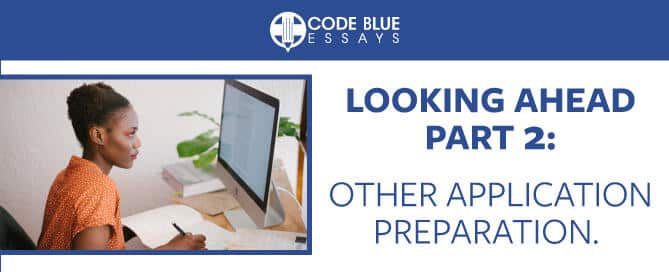Looking Ahead: Assembling Your Medical School Application
0 Comments

December 21, 2021 in Admissions, interview, Letters of Recommendation, Medical School, Medical School Application, Medical School Tips
Part 2: Other Application Preparation
Earlier this month, we spotlighted extracurricular activities that you might pursue to complete your medical school application. In this blog, we’ll discuss other ways you can get ahead in the application process now.
Get organized
To complete applications fully, you will need to know the specific requirements of the medical schools you choose. As such, you need to compile a list of your preferred medical schools. The AAMC reports that the average medical school student applied to 18 schools for the 2021-2022 cycle. Use this time to explore what factors are most important to you in a medical school. Do you prefer a particular geographical area over others? Do you want to go to a school with specific program offerings? Now is the time to do your research! Once you get a viable list, consider making a spreadsheet to organize application requirements for each of your school choices so you can be sure to fully assemble each application in advance.
One helpful tool that you can purchase through the AAMC is the Medical School Admissions Requirements (MSAR) for Applicants. MSAR is a sortable database containing all requirements for medical school applicants. You can enter your GPA and MCAT score (or goal score) to find schools for which you would be a competitive candidate.
Study for the MCAT
It is likely that if you are applying to medical school for the 2022-2023 cycle, you have at least looked into when you’re going to take the MCAT if you haven’t already scheduled/taken it.
When do I need to take the MCAT? Students should take the MCAT in April of their application year at the very latest. Medical schools will not consider an application until an MCAT score is on file, and scores take about a month to post after you take your test. Thus, an April test date would allow you to have an MCAT score on file when AMCAS starts submitting applications to schools during the first week of June.
How long do I need to study for the MCAT? Opinions vary, but the consensus is that students should study between 250 and 400 hours total for the MCAT. Plan ahead to reduce stress later!
Make Contact with References
Now is the time to be touching base with possible references to use for your medical school applications. You’ll want to ask them to write letters of recommendation well in advance, so your application is complete when you need it. Many medical schools require three letters, with the rule of thumb that two of the letters come from former science professors with whom you’ve established relationships. The third letter should come from a professor from a non-science course in most cases. Some schools request four letters, and most allow additional letters of recommendation, so it’s a good idea to cast a wide net when you’re looking for teachers or other mentors that might write you a letter. Begin by asking your potential letter writers around 3-4 months in advance, so identifying and contacting them now gives you plenty of time to secure letters.
Get Started Brainstorming and Writing Your Personal Statement
Some medical student hopefuls consider writing a personal statement the most stressful part of the application process (yes, even more than the MCAT!) Why are personal statements so painful to write? The answer lies in that it’s so difficult to talk about – or write about – ourselves. When we write about ourselves in a personal statement, we seek approval from others. A 2014 study directed subjects to imagine a scenario in which they had to build a relationship with someone who could benefit them professionally. In such a scenario, the subjects indicated subconsciously feeling “dirty” compared to subjects imagining more benign scenarios.
Writing a personal statement doesn’t have to be a negative experience, however! Code Blue Essays has a fun and easy way to jumpstart writing your personal statement with our Superhero Training Academy course. Getting an early start on your personal statement can make the difference between a stressful application season and a painless one.
Squaring your application away in advance is the best way to ensure that you have the best chances of gaining entry to the school of your choice. According to the AAMC, last year saw the largest increase in applicants ever, with 62,443 applicants in 2021-2022 compared to 53,030 in 2020-2021. Meanwhile, matriculation only saw an increase of 427 (from 22,239 to 22,666). Medical school admission is more competitive than ever, and Code Blue Essays can help make sure you have an edge over the competition with our application review and personal statement editing services.